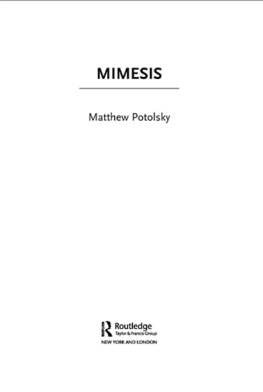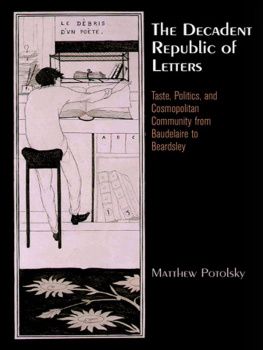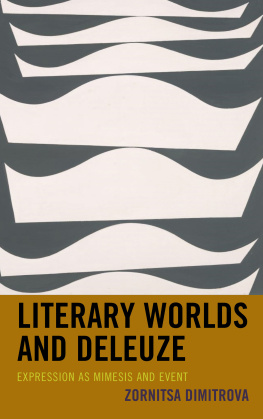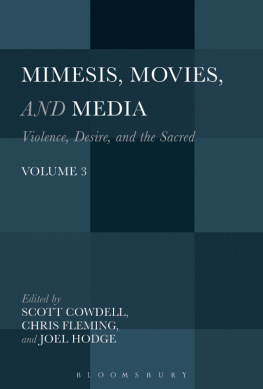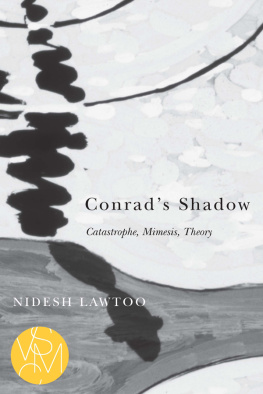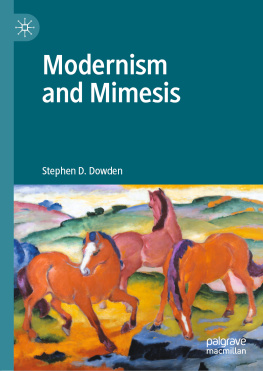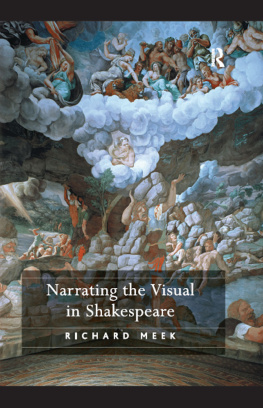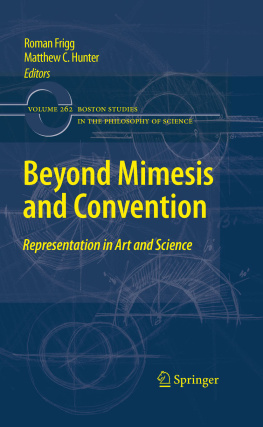Potolsky - Mimesis
Here you can read online Potolsky - Mimesis full text of the book (entire story) in english for free. Download pdf and epub, get meaning, cover and reviews about this ebook. City: Abingdon Angleterre, year: 2006, publisher: Routledge, genre: Romance novel. Description of the work, (preface) as well as reviews are available. Best literature library LitArk.com created for fans of good reading and offers a wide selection of genres:
Romance novel
Science fiction
Adventure
Detective
Science
History
Home and family
Prose
Art
Politics
Computer
Non-fiction
Religion
Business
Children
Humor
Choose a favorite category and find really read worthwhile books. Enjoy immersion in the world of imagination, feel the emotions of the characters or learn something new for yourself, make an fascinating discovery.
- Book:Mimesis
- Author:
- Publisher:Routledge
- Genre:
- Year:2006
- City:Abingdon Angleterre
- Rating:5 / 5
- Favourites:Add to favourites
- Your mark:
- 100
- 1
- 2
- 3
- 4
- 5
Mimesis: summary, description and annotation
We offer to read an annotation, description, summary or preface (depends on what the author of the book "Mimesis" wrote himself). If you haven't found the necessary information about the book — write in the comments, we will try to find it.
Potolsky: author's other books
Who wrote Mimesis? Find out the surname, the name of the author of the book and a list of all author's works by series.
Mimesis — read online for free the complete book (whole text) full work
Below is the text of the book, divided by pages. System saving the place of the last page read, allows you to conveniently read the book "Mimesis" online for free, without having to search again every time where you left off. Put a bookmark, and you can go to the page where you finished reading at any time.
Font size:
Interval:
Bookmark:
MIMESIS
The term mimesis has long been used to refer to the relationship between an image and its real original. However, recent theorists have problematized and extended the concept, allowing new perspectives on such key concerns as the nature of identity. Matthew Potolsky offers a clear introduction to this potentially daunting concept, examining:
the foundations of mimetic theory in ancient philosophy, from Plato to Aristotle
three key versions of mimesis: imitatio or rhetorical imitation, theatre and theatricality, and artistic realism
the position of mimesis in modern theories of identity and culture, through theorists such as Freud, Lacan, Girard and Baudrillard
the possible future of mimetic theory in the concept of memes, which connects evolutionary biology and theories of cultural reproduction.
An accessible and broad-ranging study of a term rapidly returning to the forefront of contemporary theory, Mimesis will be a welcome guide for readers in such fields as literature, performance and cultural studies.
Matthew Potolsky is Assistant Professor of English at the University of Utah where he teaches literary theory and modern British and comparative literature. He is co-editor of Perennial Decay: On the Aesthetics and Politics of Decadence (1999) and has published on theory and late nineteenth-century writing.
SERIES EDITOR: JOHN DRAKAKIS, UNIVERSITY OF STIRLING
The New Critical Idiom is an invaluable series of introductory guides to todays critical terminology. Each book:
provides a handy explanatory guide to the use (and abuse) of the term
offers an original and distinctive overview by a leading literary and cultural critic
relates the term to the larger field of cultural representation.
With a strong emphasis on clarity, lively debate and the widest possible breadth of examples, The New Critical Idiom is an indispensable approach to key topics in literary studies.
Also available in this series:
Adaptation and Appropriation by Julie Sanders
The Author by Andrew Bennett
Autobiography by Linda Anderson
Class by Gary Day
Colonialism/Postcolonialism second edition by Ania Loomba
Comedy by Andrew Stott
Crime Fiction by John Scaggs
Culture/Metaculture by Frances Mulhern
Difference by Mark Currie
Discourse by Sara Mills
Drama/Theatre/Performance by Simon Shepherd and Mick Wallis
Dramatic Monologue by Glennis Byron
Ecocriticism by Greg Garrard
Genders by David Glover and Cora Kaplan
Genre by John Frow
Gothic by Fred Botting
Historicism by Paul Hamilton
Humanism by Tony Davies
Ideology by David Hawkes
Interdisciplinarity by Joe Moran
Intertextuality by Graham Allen
Irony by Claire Colebrook
Literature by Peter Widdowson
Magic(al) Realism by Maggie Ann Bowers
Metre, Rhythm and Verse Form by Philip Hobsbaum
Modernism by Peter Childs
Myth by Laurence Coupe
Narrative by Paul Cobley
Parody by Simon Dentith
Pastoral by Terry Gifford
The Postmodern by Simon Malpas
The Sublime by Philip Shaw
Realism by Pam Morris
Romance by Barbara Fuchs
Romanticism by Aidan Day
Science Fiction by Adam Roberts
Sexuality by Joseph Bristow
Stylistics by Richard Bradford
Subjectivity by Donald E. Hall
The Unconscious by Antony Easthope
Matthew Potolsky

NEW YORK AND LONDON
First published 2006
by Routledge
270 Madison Ave, New York, NY 10016
Simultaneously published in the UK
by Routledge
2 Park Square, Milton Park, Abingdon, Oxon OX14 4RN
Routledge is an imprint of the Taylor & Francis Group
This edition published in the Taylor & Francis e-Library, 2006.
To purchase your own copy of this or any of Taylor & Francis or Routledges collection of thousands of eBooks please go to www.eBookstore.tandf.co.uk.
2006 Matthew Potolsky
All rights reserved. No part of this book may be reprinted or reproduced or utilized in any form or by any electronic, mechanical, or other means, now known or hereafter invented, including photocopying and recording, or in any information storage or retrieval system, without permission in writing from the publishers.
Library of Congress Cataloging in Publication Data
Potolsky, Matthew.
Mimesis/by Matthew Potolsky
p. cm. (The new critical idiom)
Includes bibliographical references and index.
1. Mimesis in literature. I. Title. II. Series.
PN56.M536P68 2006
809.912 dc22 2005027397
British Library Cataloguing in Publication Data
A catalogue record for this book is available from the British Library
ISBN 0-203-40100-X Master e-book ISBN
ISBN13: 978-0-203-40100-2 Master e-book ISBN
ISBN13: 978-1-135-99604-8 ePub ISBN
ISBN10: 0-415-70029-9 (hbk)
ISBN10: 0-415-70030-2 (pbk)
ISBN13: 9-78-0-415-70029-0 (hbk)
ISBN13: 9-78-0-415-70030-6 (pbk)
For Zoe
The New Critical Idiom is a series of introductory books which seeks to extend the lexicon of literary terms, in order to address the radical changes which have taken place in the study of literature during the last decades of the twentieth century. The aim is to provide clear, well-illustrated accounts of the full range of terminology currently in use, and to evolve histories of its changing use.
The current state of the discipline of literary studies is one where there is considerable debate concerning basic questions of terminology. This involves, among other things, the boundaries which distinguish the literary from the non-literary; the position of literature within the larger sphere of culture; the relationship between literatures of different cultures; and questions concerning the relation of literary to other cultural forms within the context of interdisciplinary studies.
It is clear that the field of literary criticism and theory is a dynamic and heterogeneous one. The present need is for individual volumes on terms which combine clarity of exposition with an adventurousness of perspective and a breadth of application. Each volume will contain as part of its apparatus some indication of the direction in which the definition of particular terms is likely to move, as well as expanding the disciplinary boundaries within which some of these terms have been traditionally contained. This will involve some re-situation of terms within the larger field of cultural representation, and will introduce examples from the area of film and the modern media in addition to examples from a variety of literary texts.
I would like to thank Stacey Margolis, Howard Horwitz, Barry Weller, John Drakakis, Liz Thompson and Megan Becker-Leckrone, who all offered valuable comments on this book. I also owe a debt of gratitude to the students in various incarnations of my course on mimesis, who helped me to work out many of the formulations and approaches to the topic that inform this book. Work on this book was supported in part by a Faculty Fellowship from the University Research Committee at the University of Utah, to whom I am grateful.
Font size:
Interval:
Bookmark:
Similar books «Mimesis»
Look at similar books to Mimesis. We have selected literature similar in name and meaning in the hope of providing readers with more options to find new, interesting, not yet read works.
Discussion, reviews of the book Mimesis and just readers' own opinions. Leave your comments, write what you think about the work, its meaning or the main characters. Specify what exactly you liked and what you didn't like, and why you think so.

